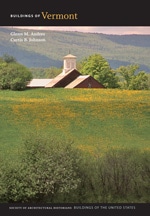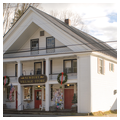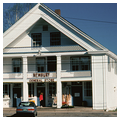The wood-frame Keyes Store is one of the most striking vernacular Greek Revival buildings remaining in Vermont. In 1823, at the age of eighteen, Freeman Keyes of Vershire began clerking in the Reed and Gould store in Newbury village. His brother Henry soon joined him and they bought the store in 1831. In 1840 they hired Newbury farmer and home builder Meader to erect a new building on the green. The two-and-a-half-story interpretation of Greek Revival is a world apart from the pattern-book variations of the day. The building face is recessed between broad corner pilasters and two slender, tapered square columns in antis that support a broken-pediment gable with a broad entablature. A second-story gallery, whose delicate metal grille railing appears original, is set within the porch. This example of a galleried commercial building with the so-called Connecticut River Valley porch is in a direct line of local commercial evolution. Here it is updated with a distinctive Greek Revival design that achieves a wonderful balance in the contrast of graceful porch elements with the massive corner and gable enframement. The Keyes's store occupied the basement, first floor, and rear ell, and they rented the second floor as an apartment. After Henry retired, his sons continued to run the store into the 1870s.
You are here
Keyes Store
If SAH Archipedia has been useful to you, please consider supporting it.
SAH Archipedia tells the story of the United States through its buildings, landscapes, and cities. This freely available resource empowers the public with authoritative knowledge that deepens their understanding and appreciation of the built environment. But the Society of Architectural Historians, which created SAH Archipedia with University of Virginia Press, needs your support to maintain the high-caliber research, writing, photography, cartography, editing, design, and programming that make SAH Archipedia a trusted online resource available to all who value the history of place, heritage tourism, and learning.









